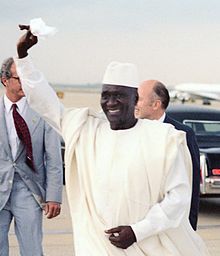Ahmed Sékou Touré
| Ahmed Sékou Touré | |
|---|---|

President Ahmed Sékou Touré of the
Republic of Guinea arrives at Andrews Air Force Base in Maryland during a visit to Washington DC. (June 1982) |
|
| 1st President of Guinea | |
|
In office October 2, 1958 – March 26, 1984 |
|
| Preceded by | None (position first established) |
| Succeeded by | Louis Lansana Beavogui |
| Personal details | |
| Born |
January 9, 1922 Faranah, Guinea |
| Died | March 26, 1984 (aged 62) Cleveland, Ohio, United States |
| Nationality | Guinean |
| Political party | Democratic Party of Guinea |
| Religion | Islam |
Ahmed Sékou Touré (var. Ahmed Sheku Turay) (January 9, 1922 – March 26, 1984) was a Guinean political leader; head of the PDG, he was elected as the first President of Guinea, serving from 1958 until his death in 1984. Touré was among the primary Guinean nationalists involved in gaining independence of the country from France.
In 1960, he declared his Parti démocratique de Guinée (PDG) the only legal party in the state, and ruled from then on as a virtual dictator. He was nominally re-elected to numerous seven year terms in the absence of any legal opposition. He imprisoned or exiled his strongest opposition leaders. It is estimated that 50,000 people were killed under his regime.
Sékou Touré was born on January 9, 1922 into a Mandinka family in Faranah, French Guinea, then a colony of France. He was an member of the Mandinka ethnic group. His great-grandfather was Samory Touré, a noted Muslim Mandinka king who founded the Wassoulou Empire (1861-1890) in the territory of Guinea and Mali, defeating numerous small African states with his large, professionally organized and equipped army. He resisted French colonial rule until his capture in 1891. He died while held in exile in Gabon.
Touré worked for the Postal Services (French: Postes, télégraphes et téléphones (PTT)), and quickly became involved in labor union activity. During his youth, Touré studied the works of Karl Marx and Vladimir Lenin, among others.
Touré first became politically active while working for the PTT. In 1945, he founded the Post and Telecommunications Workers' Union (SPTT, the first trade union in French Guinea), and he became the general secretary of the Union in 1946.
...
Wikipedia
